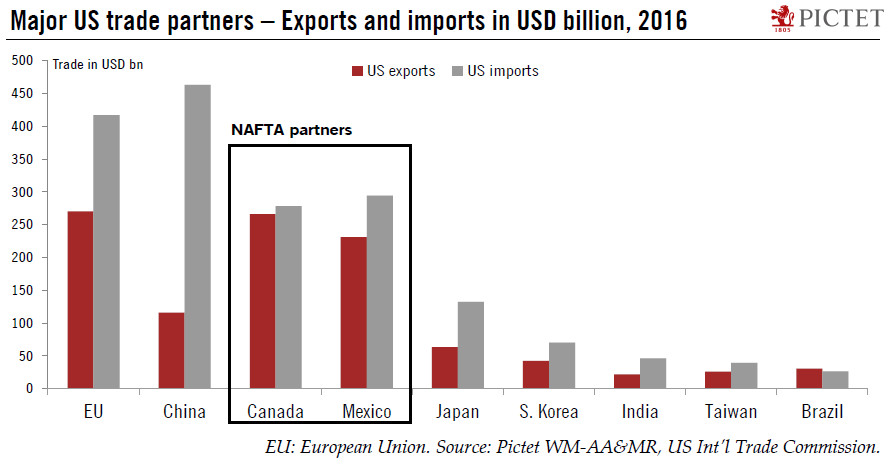We see little risk of NAFTA falling apart in the near term, but question marks remain about the US’s commitment to free trade in the longer term.NAFTA renegotiation talks, which have hit a wall as a result of the US’s blatantly mercantilist and protectionist approach, will resume in mid-November in Mexico against the backdrop of some heavy-handed anti-dumping initiatives by the US authorities, with the slapping of punitive trade tariffs on some Canada-manufactured airplanes in October still resonating vividly.Nonetheless, we do not expect Trump to withdraw from NAFTA, at least not in the coming months. We think Trump’s focus is more likely to be on the passage of tax cuts than on NAFTA in the coming months. While we see the passage of tax reform in Congress as very difficult, some modest
Topics:
Thomas Costerg considers the following as important: Macroview, NAFTA, Trade agreements, US trade policy, US trade protectionism
This could be interesting, too:
Cesar Perez Ruiz writes Weekly View – Big Splits
Cesar Perez Ruiz writes Weekly View – Central Bank Halloween
Cesar Perez Ruiz writes Weekly View – Widening bottlenecks
Cesar Perez Ruiz writes Weekly View – Debt ceiling deadline postponed
We see little risk of NAFTA falling apart in the near term, but question marks remain about the US’s commitment to free trade in the longer term.

NAFTA renegotiation talks, which have hit a wall as a result of the US’s blatantly mercantilist and protectionist approach, will resume in mid-November in Mexico against the backdrop of some heavy-handed anti-dumping initiatives by the US authorities, with the slapping of punitive trade tariffs on some Canada-manufactured airplanes in October still resonating vividly.
Nonetheless, we do not expect Trump to withdraw from NAFTA, at least not in the coming months. We think Trump’s focus is more likely to be on the passage of tax cuts than on NAFTA in the coming months. While we see the passage of tax reform in Congress as very difficult, some modest and symbolic tax cuts are not impossible, although not before February/March 2018. We also think any attempt at unilateral withdrawal from NAFTA by Trump would likely be fiercely resisted by Congress.
Much could depend on whether Republicans in Congress do deliver on their ‘mainstream’ agenda, particularly tax cuts and healthcare reform. Trump could return to more ‘populist’ and anti-trade rhetoric later in his mandate, especially if he fails to deliver on important parts of the more mainstream Republican agenda like tax cuts. Much could also depend on the magnitude of the current ‘rebellion’ led by Steve Bannon, who is threatening to field a large number of well-financed populist candidates in the Republican primaries ahead of the November 2018 elections.
There is the risk of a long-term erosion of support for NAFTA in Congress. Its current pro-trade, pro-NAFTA stance could be dented as soon as the next midterm elections, especially if more populist candidates make headway. Popular support for globalisation and free trade remains fragile in the US. The ongoing structural erosion in manufacturing jobs, which is seen as continuing in the coming years, due largely to technological progress and automation, could be blamed by politicians on NAFTA arousing further scepticism in the population, and therefore in Congress.
